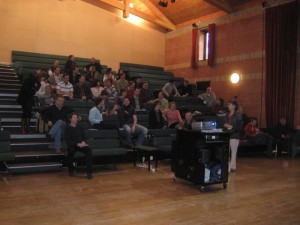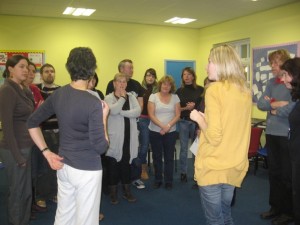Barbara and I enjoyed a stimulating session at Beeston Hall School on Tuesday. Everyone took part with enthusiasm – even the “games” we had constructed to make everyone think! The feed-back was really positive. Watch this space for more about this very enjoyable morning spent next to the North Sea at West Runton with this inspiring team of educators!
Category: News
-
-
Where has Philosophy4Children been during the summer?
It seems some time since we blogged. However, things have not stood still for Philosophy4Children. Our flight to Holland is booked and we will be off to work in Hilversum at the tDIS Teachers’ Conference in September. We are taking a somewhat circuitous route via Einhoven. More to follow….
-
Coming up for air!
Barbara and I have been working away at an article – Is philosophy what you think? – and then spent over 2,600 words explaining why it might not be. There are many misconceptions out there. We wanted to explore and explode some of these myths. The article may well appear in one of these blogs in the future – but for now I will leave you with one tantalising bit: What is the point of philosophy?
The point is to enable children to explore and deepen their thinking, to be exposed to other’s ideas, to gain confidence and become independent learners. Done well, philosophy teaches children skills for life and learning: an ability to question beyond the obvious; to disagree respectfully, giving considered reasons. This impacts on all areas of the curriculum. As one five-year-old said, “philosophy is about everything we do”. How very true.
-
No-one knows!!
See what this group of Y3 and Y4 children have to say. They started with the question Why Do We Exist? This is a tiny piece of a fascinating enquriy!
Lydia: People say the first people were cave men, but they were just normal people – cave men are nothing to do with why we are alive.
Jack: I disagree with you Lydia. If cavemen aren’t anything to do with us…
Lydia: What I mean is they weren’t the first people in the world. No-one knows who was the first.
Kara: Well, most people think Adam and Eve were the first people on earth. But, no-one knows for sure.
Emily: But Kara, to know whether Adam and Eve were the first, we have to know how they were created.
Lydia: But how can we find out? Books weren’t written then.
Kara: People in the future might be able to find out, but we never will.
-
Food for thought
“Many thanks for yesterday. I thought it went very well and has given us much food for thought.” This is the response from our latest training session. On Monday Philsophy4Children returned to London to work with a great group of teachers in Eltham. We had a very stimulating philosophical enquiry using the book The Giving Tree by Shel Silverstein (ISBN 0-060256626). This book is excellent as it always raises a variety of issues. Monday was no exception. We explored whether humans are misusing the planet; what the nature of giving is; the existence (or not) of God; the concept of Mother Nature plus much more. Indeed, a lot of food for thought!
-
What will the children get from philosophy?
Philosophy4Children travelled to Dudley, just outside Birmingham last week. The twilight session with staff from 3 local primary schools finished with a philosophical enquiry. I was asked by one of the teachers “Our thinking has gone really deep with this – what will the children get from philosophy?” The answer came the following morning when we worked with Year 2 and Year 6 to deliver demonstration lessons. The children were stunning, their thinking was just as deep and they explored (amonst other things) the meaning of love and the existence of God, they were much more able to think “outside the box” and were extremely keen to explore ideas and challenge each other. Here is some of the feedback we got “the session with the children was of particular interest as they were clearly more relaxed than the adults.” ” An extremely useful session. Good to see how children can develop, think and speak when given the chance… I expect it to aid me in my attitude towards the children as well as helping them. Of course I’ll use it.”
-
Thinking in Dulwich
Philosophy4Children enjoyed an exciting and rewarding session at Dulwich College Preparatory School in London last Monday. The enthusiasm and commitment of all the staff was very encouraging. Their involvement in the experiential session was great! The genuine desire to pursue excellence is clearly seen – there is a real buzz about the school. We would also recommend their excellent breakfast! We would like to visit this school again!
-
Tailored to your needs
One of the most important aspects of the training we offer is that it is tailored exactly to the needs of each school we visit. We recently returned to a school we first worked with a couple of years ago and found them still passionate about philosophy. As there were several teachers new to the school we split into two groups – Dot lead one group through what philosophy is and, just as important, what it is not! The second group, who had been using philosophy for some time, looked at the role of facilitator and developing questioning techniques. Feedback from both groups was very positive “…lots of good ideas on questioning to extend children” and, from a teacher new to philosophy, “I would feel confident holding a philosophy session after this training session”.
-
Partnership at Henley
Visiting the Henley partnership schools proved interesting, if somewhat crowded. All fifty of us were packed into the ICT suite – kindly provided by the high school. However trying to have eye contact with all members of the group was a real challenge! The staff demonstrated that they are keen to extend and continue their work in listening skills with their pupils. Although we were a large group in a smallish space, we just about managed to split into two for the experiential workshops. It was difficult not to overhear, and become distracted by, what the others were saying – so a lesson for us in future is to make sure that the venue is big enough! We were warmly welcomed and one member of staff said of the session: “Yes it was very useful. I think my own philosophy for learning is very similar to the ethos of this session.”
-
Philosophy on Radio 4
How exciting to hear of the importance of primary school philosophy on Radio 4 Woman’s Hour this week (27/10/10). A philosophy student at Warwick University talked about how her interest in philosophy started as a child when she explored questions such as “why am I me and not someone else” with her friend – showing how natural this thinking in children and how important it is to encourage and develop it. The two guests on the programme, Dr Angie Hobbs and Professor Helen Beebee had both seen philosophy with primary children at work “Absolutely inspirational” was the verdict of Dr Hobbs after witnessing 8 and 9 year olds in a critical thinking skills session led by SAPERE exploring the difference between wants and needs. “Marvellous, philosophy really teaches you how to think about things for yourself” was the comment from Professor Beebeee.

